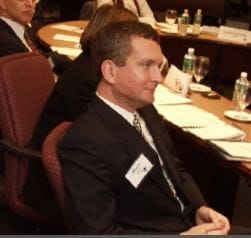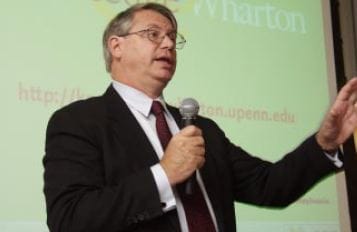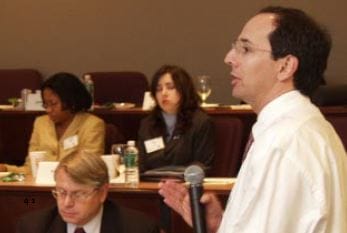Amidst the fanfare that marked October’s official dedication of Jon M. Huntsman Hall, a group of men and women came back to school for another kind of celebration. They gathered in a conference room in the Steinberg Conference Center to explore the phenomenon that keeps the School’s name and reputation vibrant for all alumni: the Wharton club network. The occasion was the club presidents workshop, a hands-on, multipurpose delving into the “Xs and Os” of running a successful alumni club.

Dana Michael, W’82
Through a variety of programs and events sponsored by a network of 82 domestic and international clubs, graduates of Wharton have the opportunity to meet and stay in touch with other alumni of the School. Membership in a local Wharton club can offer a variety of benefits, such as professional development programs, social events, publications and career management services.
The clubs work in partnership with the Office of Alumni Affairs and Annual Giving on campus, and they have the Clubs Committee of the Alumni Association Board as an important management resource. But at the end of the day, these clubs are volunteer driven: alumni gather to plan programs, manage finances, and market their organization to alumni in their area or affinity.

Board Chairman Pete Borchardt, WG’73
The sessions at the club workshop were led by those who best understand the challenges and opportunities inherent in keeping their Wharton “franchise” thriving: club officers did the talking and presented their peers with examples from their own groups’ experiences. Their Wharton case studies examined establishing a club, branding effective programs, managing volunteers, and reaching out to new and young alumni. They incited their fellow volunteer leaders to discuss their own lessons learned in keeping a Wharton alumni club strong and running.
Clubs were represented from Asia, Europe, Latin America, Canada, and the United States, as well as those from affinity groups in health care and private equity. Also in attendance were members of a newly-formed group of women from the Wharton Executive MBA (WEMBA) program, born in 2002 from the most successful second-year class gift campaign in WEMBA history. While they are the newest members of the Wharton volunteer community, the other people gathered for the club workshop represented literally hundreds of years of volunteer service to the School.
Dana Michael, W’82, helped start the Wharton Club of Hartford soon after he left campus in the early 80s and has continued his affiliation with the club network as a member of the board of the Wharton Club of New York, and as co-chair of the Alumni Association Board’s Clubs Committee. Michael has gone to club workshops throughout three decades and acknowledges how they have been “well-received in the past . . . it is a good way to stay connected.” Joy Butts, W’98, co-chair of the Clubs Committee, has not been to as many of the workshops as Michael, but nonetheless found herself “overwhelmed by the diversity of the group. People went into the room ready to talk and work. There was a lot of energy.”

Adam Weisman, G’78
It seemed appropriate that the longest-serving club president, Adam Weisman, G’78, president of the Wharton Club of Long Island, had the last word on the experience. Asked about the club workshop and the network in general, Adam said that the clubs are “a reason why people stay connected and continue the ‘Wharton experience’ when they leave campus and are back in their communities. Going back to the School for something like the club workshop adds yet another dimension.” For the volunteers who joined him on campus for the workshop, and the many more who join him in running the clubs around the world, the value of their Wharton affiliation is lifelong and vital, and is an ongoing cause for celebration.
























